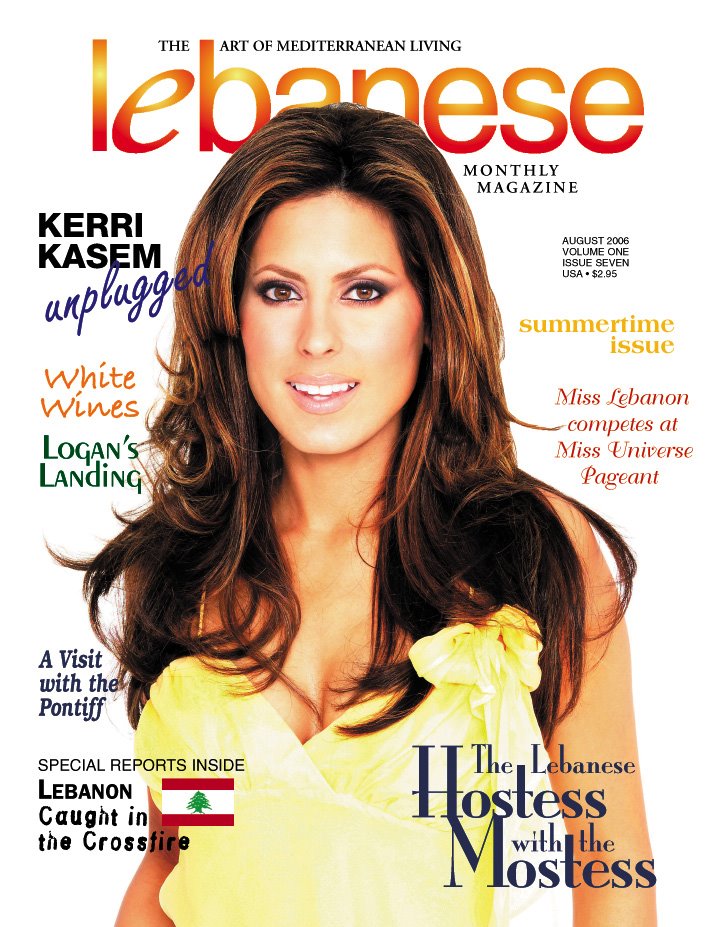Text of Speech Delivered by Elias Khalil at Lebanon Day Event
 Lebanese Contributions to the United States and the World
Lebanese Contributions to the United States and the WorldMerci ikteer John . Ana muy contento de estar aqui maa’ killkuun this evening.
I’m sorry you say, what did he just say? Yes, you did hear French, Spanish, Arabic and English. The languages of the people of many countries; the sounds of refugees, immigrants, explorers, seafarers; the languages of the Lebanese.
Ladies and Gentlemen, tonight I have been asked to say a few words about the contributions of Lebanese Americans to the United States and the World.
You see, any reflection on contributions made by Lebanese would be incomplete if we did not recognize the origins and evolution of the Lebanese. Today’s Lebanese are the descendents of the Phoenicians, whose seafaring explorations led them to explore the whole Mediterranean basin and some have postulated, far beyond. Intermingling with local populations thousands of years before Jesus and the Common Era, the Phoenicians set the stage for the modern Lebanese to inherit this international identity, speaking many languages, embracing the traveling spirit, and becoming ambassadors of good will wherever they settle.
Who were the Phoenicians and what did they leave as their legacy?
To the Phoenicians we owe a debt of gratitude for creating the world’s first recognized alphabet. Beyond the signs and symbols used by the Egyptians, the ancient Lebanese used the same sign whenever a particular sound occurred, creating a sequence of 22 letters, the first two being called Alpha and Bet.
In the first century of the Common Era, Beirut had one of only three law schools of antiquity. One of its renowned professors, Papinien, is accredited with stating that “all men are created equal.” 1800 years later, Dr. Charles Malik carried on this proud heritage when he co-authored, after World War II, the United Nations Human Rights Charter.
Pythagoras, known for his famous Pythagorean Theorem in Mathematics and inventor of the multiplication table, was born and raised in Sidon, Lebanon.
The whole continent of Europe owes its gratitude to the Phoenicians for its very name. The ancient princess of Tyre, a city in southern Lebanon, was named Europa, and Greek mythology states that she was kidnapped by the Greek God Zeus who took her to Greece, and the continent was given her name.
Beyond myth and back to fact, the properties of the North Star in the sky and its viability as a navigational reference were discovered by the Phoenicians. To the ancient Lebanese 2,100 years ago, we also acknowledge their invention of transparent glass, which we all rely on so much today.
20th & 21st Centuries
If we move to today and talk about the 20th and 21st centuries, we see Lebanese diligently fulfilling important roles in societies the world over. Often integrating and assimilating into the local culture, the Lebanese have become productive and respected citizens all over the globe. Today, we have approximately three million Lebanese in Lebanon and fifteen million in the Lebanese Diaspora.
Of Lebanese Descent
In the field of entertainment, we have the internationally recognized actresses Salma Hayek, Kathy Najimy, and Amy Yazbeck; the Latin-Pop Singer Shakira; the Glamour, Elle, Sports Illustrated, and Marie Claire cover girl model Yamila Diaz; the late comedian Danny Thomas; the current actor Tony Shalhoub; actor and former star of the T.V. Show M*A*S*H, Jamie Farr; the singer Paul Anka; and the voice of “American Top 40” Music Countdown, Casey Kasem. To name just a few.
In the field of sports, Doug Flutie, John Elway, and Jeff George are three of the many professional athletes of Lebanese descent.
In the field of writing, we have our esteemed guest of honor Elias Akouri; Hollywood sitcom writer Cindy Mort; 1990 Pulitzer Prize Winner Steven Naifeh; internationally recognized journalist and author Amin Maalouf; former Dean of the White House Press Corps Helen Thomas; and one of America’s great poet-philosophers Gibran Khalil Gibran.
In the field of science and academics, we have Elias Zerhouni, current director of the National Institutes of Health in Washington D.C.; Christa McAuliffe, teacher and astronaut on the fatal flight of the Space Shuttle Challenger; Michael Debaky, Heart Surgeon and Chancellor of Baylor University College of Medicine; and David Adamany, former president of Wayne State University.
In the field of science and academics, we have Elias Zerhouni, current director of the National Institutes of Health in Washington D.C.; Christa McAuliffe, teacher and astronaut on the fatal flight of the Space Shuttle Challenger; Michael Debaky, Heart Surgeon and Chancellor of Baylor University College of Medicine; and David Adamany, former president of Wayne State University.
In the field of business and entrepreneurship, we have Paul Orfalea, founder and CEO of Kinko’s; Jack Nasser, former President of Ford Motor Company; Joseph Abboud, founder and designer of Joseph Abboud clothing line; and Carlos Ghosn, current President of Nissan Motor Company.
And finally, in the field closest to the heart of all of you here tonight, the field of politics and public service. The countries of Guatemala, Ecuador, and Argentina have all had Presidents of Lebanese descent. With approximately eight million citizens of Lebanese descent in Brazil, twenty percent of the National Parliament there can claim Lebanese ancestry.
With approximately three million Americans of Lebanese descent in the U.S., we can start in this room with great local public servants like Councilman John Akoury. In Michigan we have had the former Attorney General Joseph Deeb, and former U.S. Senator and Secretary of Energy Spencer Abraham. Across the country we had John H. Sununu as Chief of Staff under President George H.W. Bush; Donna Shalala as Secretary of Health and Human Services under President Clinton; and U.S. Army Central Commander currently directing U.S. military operations in Iraq, General John Abizaid; again just to name a few.
Lebanese Americans are proud and dedicated citizens of this country. Ordinarily we do not publicly display the labels of our ancestry; for when we settle down, we integrate and assimilate. Yet recognizing that this particular country, the United States, draws its very strength from its cultural and ethnic diversity , we are proud tonight and always, to be a part of the mosaic that is America. Thank you, or as I stated earlier, merci ikteer for giving me this opportunity to share with you some of the richness of our Lebanese heritage.
Written by Elias Joseph Khalil, American Citizen of Lebanese descent. Elias is a teacher of Economics, World Religions, and International Affairs at North Farmington High School, in Farmington Hills, Michigan. He can be reached at elias.khalil@farmington.k12.mi.us










































<< Home